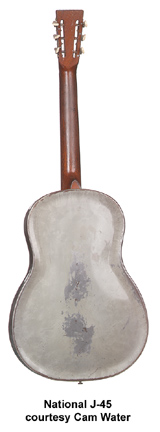
|
 NATIONAL NATIONAL | ||
| Instruments previously produced in Los Angeles, CA during the mid-1920s to the mid-1930s. Instruments produced in Chicago, IL from mid-1930s to 1969. After National moved production to Chicago in the mid-1930s, they formally changed the company name to Valco (but still produced National brand guitars). Instruments produced in Japan circa 1970s. Distributed by Strum'N Drum of Chicago, IL. When Valco went out of business in 1969, the National trademark was acquired by Strum'N Drum, who then used the trademark on a series of Japanese built guitars. | ||
| The Dopyera family emigrated from the Austro-Hungary area to Southern California in 1908. In the early 1920s, John and Rudy Dopyera began producing banjos in Southern California. They were approached by guitarist George Beauchamp to help solve his "volume" (or lack thereof) problem with other instruments in the vaudeville orchestra. In the course of their conversation, the idea of placing aluminum resonators in a guitar body for amplification purposes was developed. John Dopyera and his four brothers (plus some associates like George Beauchamp) formed National in 1925. The initial partnership between Dopyera and Beauchamp lasted for about two years, and then John Dopyera left National to form the Dobro company. National's corporate officers in 1929 consisted of Ted E. Kleinmeyer (pres.), George Beauchamp (sec./gen. mgr.), Adolph Rickenbacker (engineer), and Paul Barth (vice pres.). In late 1929, Beauchamp left National, and joined up with Adolph Rickenbacker to form Ro-Pat-In (later Electro String/Rickenbacker). At the onset of the American Depression, National was having financial difficulties. Louis Dopyera bought out the National company; and as he owned more than 50% of the stock in Dobro, "merged" the two companies back together (as National Dobro). In 1936, the decision was made to move the company to Chicago, Illinois. Chicago was a veritable hotbed of mass produced musical instruments during the early to pre-World War II 1900s. Manufacturers like Washburn and Regal had facilities, and major wholesalers and retailers like the Tonk Bros. and Lyon & Healy were based there. Victor Smith, Al Frost, and Louis Dopyera moved their operation to Chicago, and in 1943 formally announced the change to Valco (The initials of their three first names: Victor-Al-Louis Company). Valco worked on war materials during World War II, and returned to instrument production afterwards. Valco produced the National/Supro/Airline fiberglass body guitars in the 1950s and 1960s, as well as wood-bodied models. In 1969 or 1970, Valco Guitars, Inc. went out of business. The assets of Valco/Kay were auctioned off, and the rights to the National trademark were bought by the Chicago, Illinois-based importers Strum'N Drum. Strum'N Drum, which had been importing Japanese guitars under the Norma trademark, were quick to introduce National on a line of Japanese produced guitars that were distributed in the U.S. market. Author/researcher Michael Wright points out that the National "Big Daddy170 bolt-neck black LP copy was one of the first models that launched the Japanese "Copy Era" of the 1970s. Early company history courtesy Bob Brozman, The History and Artistry of National Resonator Instruments; model descriptions compiled by Dave Hull, "Copy Era" National information courtesy Michael Wright. | ||
| ||
| ACOUSTIC: SINGLE CONE MODELS | ||
| ACOUSTIC: TRICONE MODELS | ||
| ACOUSTIC: WOODEN BODY MODELS | ||
| ACOUSTIC: NON-RESONATOR MODELS |

